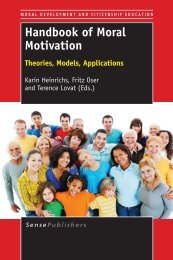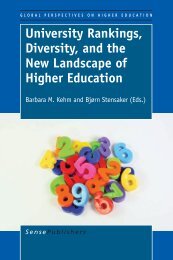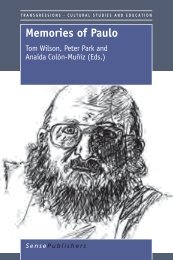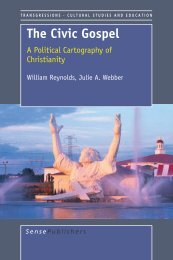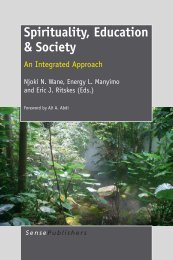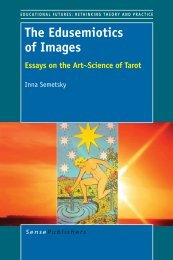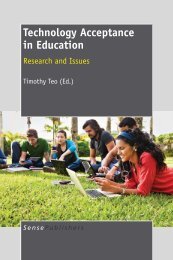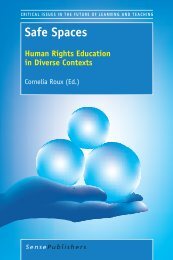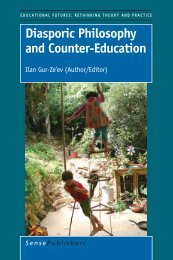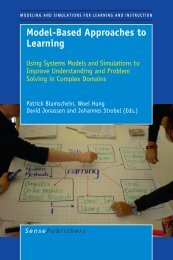Rupturing Concepts of Disability and Inclusion
Rupturing Concepts of Disability and Inclusion
Rupturing Concepts of Disability and Inclusion
You also want an ePaper? Increase the reach of your titles
YUMPU automatically turns print PDFs into web optimized ePapers that Google loves.
PROLOGUE<br />
hardships in terms <strong>of</strong> access <strong>and</strong> opportunity; but most importantly, underst<strong>and</strong>ing<br />
<strong>of</strong> their particular experiences <strong>and</strong> needs.<br />
Misinterpretation <strong>and</strong> ignorance manifested itself in many forms. From my<br />
position as a Supplementary Services Worker in child care services, I saw parents<br />
<strong>and</strong> families continually be subjected to ‘pr<strong>of</strong>essionals’ who thrived on discretionary<br />
opinions. I found myself in somewhat <strong>of</strong> a liminal position - on the threshold<br />
because <strong>of</strong> the knowledge gained as a pseudo-parent, <strong>and</strong> <strong>of</strong> now being employed<br />
as a pr<strong>of</strong>essional worker with newly- acquired university knowledge. But I found<br />
the same sort <strong>of</strong> misused power active in the context <strong>of</strong> pr<strong>of</strong>essionalism that had<br />
underpinned my nursing experience some 15 years earlier. I saw people making<br />
decisions about worth, desires <strong>and</strong> opportunities from the security <strong>and</strong> distant<br />
isolation <strong>of</strong> nice workplaces, rarely daring to visit families in their own environment.<br />
These decisions were made with the power that could determine someone’s access<br />
to services, to education, <strong>and</strong> to financial entitlements. I also saw first h<strong>and</strong> the<br />
despair <strong>of</strong> invisibility felt by families as they struggled to be understood <strong>and</strong> heard.<br />
But most alarmingly, I was exposed to the crippling effects <strong>of</strong> guilt constantly<br />
imposed on parents by a society who determined that these conditions were selfimposed.<br />
I heard stories <strong>of</strong> how parents were told that their child’s condition had<br />
been the result <strong>of</strong> parental sin; for living in particular relationships; <strong>and</strong> for not<br />
choosing certain moral paths. And I found it disturbing that these assessments<br />
were propagated by different Christian churches. A paradox was evident - publicly,<br />
churches were involved in service activities; whilst privately, certain members felt<br />
they had a right to police what they perceived as expressions <strong>of</strong> the immorality <strong>of</strong><br />
society. Somehow, legislation <strong>and</strong> pr<strong>of</strong>essionalism couldn’t address these realities.<br />
A couple <strong>of</strong> years later, we again lived in the large metropolitan city. One evening,<br />
we received a telephone call from a friend to tell us that Trudy had been admitted<br />
to a hospital. She was very unwell, <strong>and</strong> cancer <strong>of</strong> the liver was suspected – the<br />
diagnosis confirmed, in fact, a couple <strong>of</strong> days later. When we visited her that night,<br />
we effectively turned the clock back to the late 1970s. She was sitting up in bed<br />
when we arrived about 8pm. Her meal tray, which had been distributed around<br />
5.30pm, was still on her bedtable. With an intravenous drip in her arm, <strong>and</strong> crying<br />
with each small mouthful because <strong>of</strong> pain, she was endeavouring to eat her dinner,<br />
committed to her lifelong discipline <strong>of</strong> needing to eat everything provided to meet<br />
her dietary requirements. We immediately engaged in conversations <strong>of</strong> the past,<br />
<strong>and</strong> again to hold her had a small, yet still significant, effect.<br />
When a nurse did come to attend to her, I asked if Trudy could have something<br />
for the obvious discomfort she was in. His reply was that she had been <strong>of</strong>fered an<br />
injection a couple <strong>of</strong> hours earlier, but had grizzled when they tried to give it to<br />
her. He then declared how they assumed she mustn’t like needles; <strong>and</strong> how they<br />
can’t waste these drugs, “you know”, so it was decided to ab<strong>and</strong>on the attempt.<br />
Pulling out my nursing survival tool kit which I surprisingly discovered I still<br />
carried, I made an icy response. It seemed quite unimaginable to me, <strong>and</strong> now<br />
hopefully to him, how this young woman with insulin-dependent diabetes requiring<br />
two injections a day since she was 6 years old, could be scared <strong>of</strong> needles. I then<br />
xxvi




